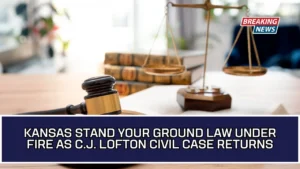Jimmy and Jabrion Hardin were traveling on Interstate 44 near Vinita, Oklahoma, when they were pulled over by Oklahoma Highway Patrol Trooper Seth Hudson.
Though no citation was issued, Hudson claimed the stop was due to an improper lane change and conducted a search based on the odor of marijuana.
During the search, Hudson discovered a small pipe with marijuana residue, three firearms, and $62,650 in cash.
Despite providing documentation that the cash came from a $90,233 settlement with Juul Labs, authorities confiscated the money, guns, and three cell phones under Oklahoma’s civil asset forfeiture law.
Ongoing Legal Struggles
Though criminal charges have not been filed, and the phones were returned in March, the cash and weapons remain in state custody. The brothers’ attorney filed a civil application to retrieve the remaining property, but no formal forfeiture notice has yet been filed.
Attorney Christa Alderman, representing the Department of Public Safety, argued that the smell of marijuana and inconsistencies in the Hardins’ statements established probable cause for the seizure. She also claimed that the brothers lied about possessing firearms.
“Where probable cause exists… peace officers must detain that property,” Alderman said.
Millions Seized with Few Charges Filed
An investigation by Oklahoma Watch revealed that from 2023 to 2024, Craig County law enforcement seized over $1.5 million, often through similar highway stops. Notably, two-thirds of these cases were not accompanied by criminal charges.
Statewide, Oklahoma law enforcement agencies seized $9.5 million in 2018, with no legal requirement to publicly report forfeiture activities.
Push for Reform Faces Resistance
Civil rights advocates and some lawmakers, including Governor Kevin Stitt, have long criticized the state’s civil forfeiture laws for allowing property to be taken without criminal charges or convictions. In his 2024 State of the State address, Stitt remarked:
“It’s crazy to me that someone can have their truck and cash taken, be acquitted, and still never get their property back.”
Although more than 36 states have implemented reforms since 2014, efforts in Oklahoma—such as Senate Bill 596, which would require annual reporting—have repeatedly stalled in the legislature.
Law Enforcement Pushback
Former State Senator Kyle Loveless, a long-time critic of the practice, noted that attempts to change the system were met with intense opposition from law enforcement.
“Every sheriff had a press conference calling me a tool of the drug cartel,” he said.
Nonetheless, Loveless and Alasdair Whitney from the Institute for Justice remain hopeful that Congress or the U.S. Supreme Court will ultimately curtail or regulate the practice.
The recent Culley v. Marshall ruling has brought new attention to the issue, though property owners are still not entitled to preliminary hearings.
Hardin Brothers Left Waiting
The Hardins’ case remains unresolved nearly a year later. A tentative trial date is set for October 2025. Jabrion Hardin, who uses the Juul settlement money to pay for seizure medication, fears for his health:
“It’s $500 for medicine to keep me alive, and then road pirates take my money. That could’ve happened to anyone.”
Oklahoma’s use of civil asset forfeiture continues to spark legal challenges and calls for reform. With millions seized and few criminal cases, critics argue the system disproportionately targets innocent individuals and lacks adequate oversight.
As legal battles persist, families like the Hardins await justice—and a system that balances law enforcement with basic fairness.




